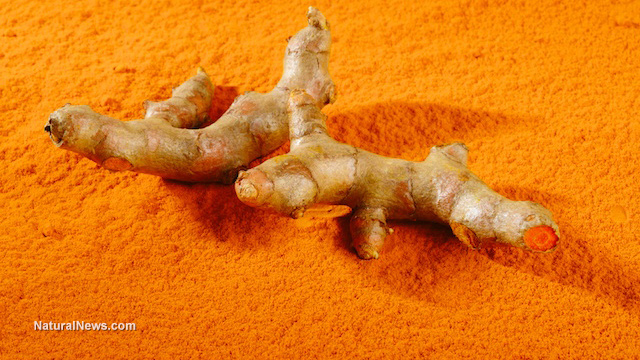Find out how to prevent and kill cancer with inexpensive, natural, non invasive remedies.
***Article Originally Published by Natural News on Feb 10, 2015***
(NaturalNews) Turmeric is a bright yellow root with a tan skin that is typically used in Middle Eastern, Northern African, and Southeast Asian cuisine. Turmeric is one of the main ingredients in curry spice blends, and it makes a great addition to soups, meats, salads, stir-frys, and more. It's a very versatile herb that enhances the flavor of a great many dishes.
Curcuminoids are the beneficial compounds within turmeric. Specifically, curcumin, one of these specific compounds, is considered to be the most potent, medicinally powerful, cancer-killing component of turmeric. Curcumin helps to detoxify and rejuvenate the liver, reduces negative effects of iron overload (and this is important because iron with sweet wormwood is a powerful cancer killer, too), increases antioxidant capacity in the body, regenerates brain cells and improves cognitive function, reduces likelihood of and treats Alzheimer's, is anti-inflammatory, reduces heart disease risk, reduces depression, and fights premature aging.
How does curcumin kill cancer? It literally kills cancer.
The Murderous Aspect Of Curcumin
The human body contains approximately 10-13 trillion cells. We replace these cells at the rate of approximately 100 to 130 billion each day. A tightly regulated, cell- suicide process known as programmed cell death or apoptosis destroys cells.
Cancer cells don't suicide. They turn off the suicide genes.
Curcumin activates the death receptors through many different means, ways we are still learning. One of the more interesting ways is by activating enzymes that literally chop up the proteins within the cells. It is believed that one of the reasons cancer cells do not develop some sort of resistance to curcumin like they do with chemo drugs, is due to the fact that curcumin activates the cells death in so many different ways. We also don't know exactly why curcumin doesn't kill normal healthy cells, but it doesn't. It seems to simply target the cells that were supposed to have already died.
Our bodies want to dispose of most of the curcumin we eat. Without help, our ability to absorb curcumin would be very low.
How to Increase the Bioavailability of Curcumin
The only problem with curcumin is that our liver, in an effort to prevent excessive drugs and supplements and such, inhibits most of the absorption of curcumin (a process called glucuronidation), which makes the compound much less effective than it could be. But there are ways to increase the body's ability to absorb curcumin.
Mix Turmeric With Black Pepper
Piperine is the alkaloid responsible for the pungency of black pepper. This compound inhibits certain enzyme metabolism functions, which normally cause the disposal of what the body considers to be excess curcumin (this effect is not limited to curcumin, black pepper can increase the absorption of other supplements, too). Curcumin absorption increases up to 2,000% or more with just a small amount of piperine.
Consume Turmeric with Beneficial Fats
Curcumin is fat-soluble. Without fat, the compound doesn't dissolve properly, and then curcumin has a tough time getting into the gut and being absorbed into the bloodstream and then into the cells that needs the compound.
Try consuming turmeric with healthy fats like avocado, olive oil, and coconut oil.
Eat Turmeric With Quercetin
Quercetin is a plant flavonoid that inhibits the enzyme that deactivates curcumin.
Foods high in quercetin include red wine, red grapes, onions, green tea, apples, cranberries, blueberries, black plums, red leaf lettuce, raw kale, chicory greens, raw spinach, sweet peppers, snap beans and raw broccoli. The best whole food source of quercetin is capers.
Conclusion
If you're looking to kill cancer, or get the other benefits from turmeric, don't just pop a few curcumin pills. We are discovering the incredible synergistic relationships of many different foods. The best way, really the only way, to get your body to a place of optimum health is by consuming a wide variety of produce and eliminating toxic, refined foods. Check out this golden milk tea recipe and see Foods, Vitamins, and Herbs That Kill Cancer.
Related:
How to easily grow turmeric in the comfort of your own home
Foods, herbs, and supplements that kill cancer - safer and more effective than drugs
